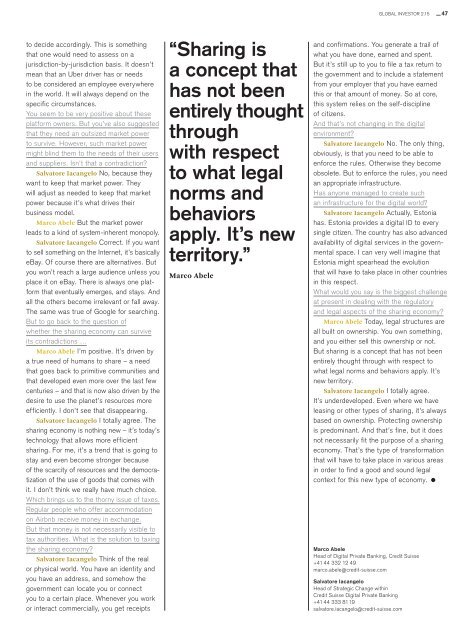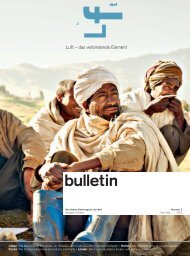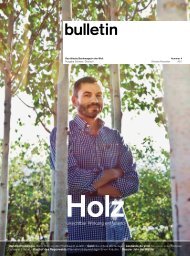The sharing economy
New opportunities, new questions Global Investor, 02/2015 Credit Suisse
New opportunities, new questions
Global Investor, 02/2015
Credit Suisse
You also want an ePaper? Increase the reach of your titles
YUMPU automatically turns print PDFs into web optimized ePapers that Google loves.
GLOBAL INVESTOR 2.15 — 47<br />
to decide accordingly. This is something<br />
that one would need to assess on a<br />
jurisdiction-by-jurisdiction basis. It doesn’t<br />
mean that an Uber driver has or needs<br />
to be considered an employee everywhere<br />
in the world. It will always depend on the<br />
specific circumstances.<br />
You seem to be very positive about these<br />
platform owners. But you’ve also suggested<br />
that they need an outsized market power<br />
to survive. However, such market power<br />
might blind them to the needs of their users<br />
and suppliers. Isn’t that a contradiction?<br />
Salvatore Iacangelo No, because they<br />
want to keep that market power. <strong>The</strong>y<br />
will adjust as needed to keep that market<br />
power because it’s what drives their<br />
business model.<br />
Marco Abele But the market power<br />
leads to a kind of system-inherent monopoly.<br />
Salvatore Iacangelo Correct. If you want<br />
to sell something on the Internet, it’s basically<br />
eBay. Of course there are alternatives. But<br />
you won’t reach a large audience unless you<br />
place it on eBay. <strong>The</strong>re is always one platform<br />
that eventually emerges, and stays. And<br />
all the others become irrelevant or fall away.<br />
<strong>The</strong> same was true of Google for searching.<br />
But to go back to the question of<br />
whether the <strong>sharing</strong> <strong>economy</strong> can survive<br />
its contradictions …<br />
Marco Abele I’m positive. It’s driven by<br />
a true need of humans to share – a need<br />
that goes back to primitive communities and<br />
that developed even more over the last few<br />
centuries – and that is now also driven by the<br />
desire to use the planet’s resources more<br />
efficiently. I don’t see that disappearing.<br />
Salvatore Iacangelo I totally agree. <strong>The</strong><br />
<strong>sharing</strong> <strong>economy</strong> is nothing new – it’s today’s<br />
technology that allows more efficient<br />
<strong>sharing</strong>. For me, it’s a trend that is going to<br />
stay and even become stronger because<br />
of the scarcity of resources and the democratization<br />
of the use of goods that comes with<br />
it. I don’t think we really have much choice.<br />
Which brings us to the thorny issue of taxes.<br />
Regular people who offer accommodation<br />
on Airbnb receive money in exchange.<br />
But that money is not necessarily visible to<br />
tax authorities. What is the solution to taxing<br />
the <strong>sharing</strong> <strong>economy</strong>?<br />
Salvatore Iacangelo Think of the real<br />
or physical world. You have an identity and<br />
you have an address, and somehow the<br />
government can locate you or connect<br />
you to a certain place. Whenever you work<br />
or interact commercially, you get receipts<br />
“Sharing is<br />
a concept that<br />
has not been<br />
entirely thought<br />
through<br />
with respect<br />
to what legal<br />
norms and<br />
behaviors<br />
apply. It’s new<br />
territory.”<br />
Marco Abele<br />
and confirmations. You generate a trail of<br />
what you have done, earned and spent.<br />
But it’s still up to you to file a tax return to<br />
the government and to include a statement<br />
from your employer that you have earned<br />
this or that amount of money. So at core,<br />
this system relies on the self-discipline<br />
of citizens.<br />
And that’s not changing in the digital<br />
environment?<br />
Salvatore Iacangelo No. <strong>The</strong> only thing,<br />
obviously, is that you need to be able to<br />
enforce the rules. Otherwise they become<br />
obsolete. But to enforce the rules, you need<br />
an appropriate infrastructure.<br />
Has anyone managed to create such<br />
an infrastructure for the digital world?<br />
Salvatore Iacangelo Actually, Estonia<br />
has. Estonia provides a digital ID to every<br />
single citizen. <strong>The</strong> country has also advanced<br />
availability of digital services in the governmental<br />
space. I can very well imagine that<br />
Estonia might spearhead the evolution<br />
that will have to take place in other countries<br />
in this respect.<br />
What would you say is the biggest challenge<br />
at present in dealing with the regulatory<br />
and legal aspects of the <strong>sharing</strong> <strong>economy</strong>?<br />
Marco Abele Today, legal structures are<br />
all built on ownership. You own something,<br />
and you either sell this ownership or not.<br />
But <strong>sharing</strong> is a concept that has not been<br />
entirely thought through with respect to<br />
what legal norms and behaviors apply. It’s<br />
new territory.<br />
Salvatore Iacangelo I totally agree.<br />
It’s underdeveloped. Even where we have<br />
leasing or other types of <strong>sharing</strong>, it’s always<br />
based on ownership. Protecting ownership<br />
is predominant. And that’s fine, but it does<br />
not necessarily fit the purpose of a <strong>sharing</strong><br />
<strong>economy</strong>. That’s the type of transformation<br />
that will have to take place in various areas<br />
in order to find a good and sound legal<br />
context for this new type of <strong>economy</strong>.<br />
Marco Abele<br />
Head of Digital Private Banking, Credit Suisse<br />
+41 44 332 12 49<br />
marco.abele@credit-suisse.com<br />
Salvatore Iacangelo<br />
Head of Strategic Change within<br />
Credit Suisse Digital Private Banking<br />
+41 44 333 81 19<br />
salvatore.iacangelo@credit-suisse.com

















